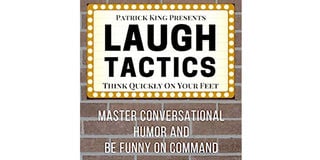Prime
How humour lightens the load of an often crushing existence

What you need to know:
Being funny or, better yet, being considered funny is a soft skill most of us crave. This could be why Ugandans are generally of a lighthearted predisposition. We use humour to lighten the load of an often crushing existence.
Title: Laugh Tactics: Master Conversational Humor and Be Funny On Command - Think Quickly On Your Feet
Author: Patrick King
Price: Shs43,000
Availability: Amazon
Pages: 131
Published: 2016
We can make others feel good with humour. We make ourselves feel good because it draws attention to us in a positive way. It validates us, and makes us feel like part of a group and that we matter to the people around us,” writes Patrick King in his book Laugh Tactics: Master Conversational Humor and Be Funny On Command - Think Quickly On Your Feet.
He adds: “Many of us use humour as our primary form of validation. Everybody craves some form of external validation and anyone that says otherwise, is lying through their teeth. Humour allows you to get that validation because it is an indirect way of showing off and people typically assume intelligence in conjunction with witty, clever humour – minus fart jokes.”
Being funny or, better yet, being considered funny is a soft skill most of us crave. This could be why Ugandans are generally of a lighthearted predisposition. We use humour to lighten the load of an often crushing existence.
This is why humour is important to us. If there is a bell curve indicating how important it is to us, there are few outliers who think it is not.
Most of us want the acclaim humour brings, without having to venture into stand-up comedy. As that would mean methodically employing puns, premises, jokes, setups, and forms of delivery that brighten every waking moment of sleepy strangers for the duration of one’s set (read performance).
This book melds the essence of private gags with the oneness of public applause in order to improve not only our public speaking skills, but also our conversational skills.
How can this be done?
Well, one of the tactics is to expose oneself to humour and funny people on a daily basis. This can be done by watching comedy shows; be they sitcoms, stand-up shows or sketch comedies.
You have to know what is funny in order to be funny. And such exposure is one way of summoning up the Anne Kansiime chuckling discreetly within you.
Two, “You need to be clear as to the emotion you want to evoke. It has to be articulable, and you have to know it beforehand,” the author says.
“Knowing your primary emotion focuses your story or joke. It makes sure that it does not veer off into tangents and destroy your delivery. Even worse, people might not realise when you get to your punch line, or the part of the story that is supposed to be funny”.
We have all heard those storytellers, who set out to tell us about a funny occurrence that animated their day, only for them to drop that fable by the wayside as they focus on intricacies.
Such minutiae are usually expressed by the details leading up the punchline. So instead of somebody telling you about the funny thing that happened to them at a joint in, say, Bugolobi; they will ask you if you know the joint. And if you do not, much of the story will be
“If you can make that your goal and accomplish it, then anything else you want to gain by talking to someone will flow naturally,” King writes. If you genuinely want to make people laugh, you ultimately will.
This book melds the essence of private gags with the oneness of public applause in order to improve not only our public speaking skills, but also our conversational skills. Being intellectually curious and adventurous is a great way to start.




